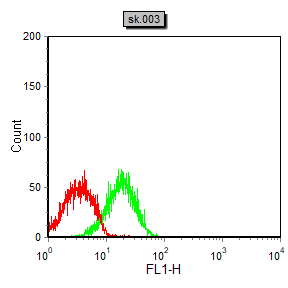
| WB | 咨询技术 | Human,Mouse,Rat |
| IF | 咨询技术 | Human,Mouse,Rat |
| IHC | 咨询技术 | Human,Mouse,Rat |
| ICC | 技术咨询 | Human,Mouse,Rat |
| FCM | 1/200 - 1/400 | Human,Mouse,Rat |
| Elisa | 咨询技术 | Human,Mouse,Rat |
| Aliases | HM3;PBS;EGBRS;m3AChR |
| Entrez GeneID | 1131 |
| clone | 5D7E11 |
| WB Predicted band size | 66kDa |
| Host/Isotype | Mouse IgG2b |
| Antibody Type | Primary antibody |
| Storage | Store at 4°C short term. Aliquot and store at -20°C long term. Avoid freeze/thaw cycles. |
| Species Reactivity | Human |
| Formulation | Purified antibody in PBS with 0.05% sodium azide |
+ +
以下是关于CHRM3抗体的3篇参考文献示例(注:信息基于模型训练数据,建议通过学术数据库核实准确性):
---
1. **文献名称**:*Autoantibodies against M3 muscarinic acetylcholine receptor in patients with Sjögren's syndrome*
**作者**:Naito S, et al.
**摘要概述**:研究报道干燥综合征患者血清中存在抗CHRM3抗体,这些抗体通过阻断乙酰胆碱信号通路抑制唾液腺分泌功能,可能与疾病病理相关。
2. **文献名称**:*Role of M3 muscarinic receptor in bladder smooth muscle contraction: evidence from antibody-based inhibition studies*
**作者**:Matsui M, et al.
**摘要概述**:利用CHRM3特异性抗体阻断受体功能,发现其显著减弱膀胱平滑肌收缩,证实CHRM3在排尿调控中的关键作用。
3. **文献名称**:*Altered expression of M3 muscarinic receptor in diabetic bladder dysfunction: an immunohistochemical study*
**作者**:Yoshida M, et al.
**摘要概述**:通过CHRM3抗体免疫组化分析,发现糖尿病模型动物膀胱组织中受体表达下调,提示其与糖尿病性膀胱功能障碍的关联。
---
如需进一步文献,建议在PubMed或Web of Science中检索关键词“CHRM3 antibody”或“M3 muscarinic receptor antibody”。
The CHRM3 antibody is a research tool designed to target the human M3 muscarinic acetylcholine receptor (CHRM3), a G protein-coupled receptor (GPCR) that mediates acetylcholine signaling in various tissues. CHRM3 is widely expressed in smooth muscles, exocrine glands, and the central nervous system, playing key roles in regulating processes like salivary secretion, bladder contraction, and cognitive functions. Dysregulation of CHRM3 has been implicated in pathologies such as overactive bladder syndrome, Sjögren’s syndrome, and certain cancers.
CHRM3 antibodies are typically developed as monoclonal or polyclonal reagents to detect and quantify receptor expression in experimental models. They are utilized in techniques like Western blotting, immunohistochemistry (IHC), and flow cytometry to study receptor localization, expression patterns, and signaling mechanisms. For example, in cancer research, CHRM3 antibodies help investigate receptor overexpression in tumors, potentially linking it to cell proliferation or metastasis.
These antibodies also aid in exploring autoimmune disorders where autoantibodies against CHRM3 may disrupt autonomic functions. Validation of CHRM3 antibodies often involves knockout cell lines or tissue controls to ensure specificity. Commercial availability from biotech vendors supports their use in both basic and translational research, contributing to drug discovery and biomarker studies targeting muscarinic pathways. However, variability in antibody performance across applications necessitates careful optimization to ensure reliable results.
×